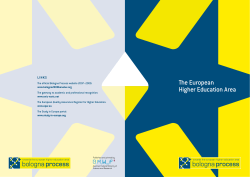
Culture, Language and Religion in Russia and Europe
International Conference Culture, Language and Religion in Russia and Europe: Key Aspects in Education for Tolerance Tolerance without dialogue is a euphemism for indifference. (Count Miklós Cseszneky, Párbeszéd, 2009) The responsibility of tolerance lies with those who have the wider vision. (George Eliot, The Mill on the Floss, 1860) Common stereotypes perceive Russia as a vast, cold and largely unexplored country, inhabited by people who have homogeneous physical and cultural features. However, there are representatives of more than 100 ethnic groups in the Russian Federation and the contemporary migration flows are rapidly increasing. Within this context, Higher Education Institutions have an important role in Russian society: enhancing inter-ethnic and intercultural competence and tolerance towards differences in society at large, and in educational settings in particular. The concepts of culture, language and religion take on different nuances in Europe and in the Russian Federation, but commonalities and shared challenges can be identified and these can open new spaces for cooperation and development of knowledge, directions, prospects and practices for an education for tolerance and coexistence that should be respectful of differences. This is not to be understood as a simple acceptance of diversity, but as co-collective construction of a new way of understanding the community and living together in the common space. This conference has been organised within the auspices of the ALLMEET project. The conference has been conceived as an opportunity for researchers, students and stakeholders from different European countries and Russian regions to encounter each other, discover each other’s ideas and to reflect together, with the potential to build new bridges and generate new ideas. Despite common perceptions, Russia and Europe are deeply interconnected, and tolerance and intercultural education are major priorities for both Russia and Europe as they both strive to ensure social stability and cultural enrichment. Aula Magna Department of Educational Studies “G. M. Bertin” Via Filippo Re 6, Bologna Photo by Giuseppe Gaeta - Graphic project by GOLD STUDIO di Michele Campani International Conference é é é é é é é Culture, Language and Religion in Russia and Europe: Key Aspects in Education for Tolerance 20 April 2015 Aula Magna - Department of Educational Studies “G. M. Bertin” Via Filippo Re 6, Bologna é Panel 1. The Impact of Language in Intercultural Dynamics (Meeting Room - Department of Educational Studies) Chair: Gabriella Elina Imposti (University of Bologna) The Power of Identity and Misleading Stereotypes Chair: Silvia Demozzi (University of Bologna) 15,50-16,20: Minority Languages in Italy and in the Russian Federation: Between Theory and Practice, Monica Perotto (University of Bologna) 9,30-9,50 Welcome: Carla Salvaterra, Vice Rector for International Relations (University of Bologna) Luigi Guerra, Director of the Department of Educational Studies (University of Bologna) Roberta Caldin, Vice President of the School of Psychology and Education (University of Bologna) Amelia Frascaroli, Councillor for Social Services, Volunteering, Associations and Participation, Subsidiarity, Active Policies for Employment, Municipality of Bologna 11,50-12,05: Eyes for the Blind. Portraits of Russia in Western Collective Imagery, Federico Zannoni (University of Bologna) 9,50-10,00 Opening: The Origins of a Multicultural Cooperation, Antonio Genovese (University of Bologna) 14,00-14,15: Key Issues of understanding Culture for Education to Tolerance, Irina Tiurikova (Northern [Arctic] Federal University) Panel 2. Situations endangering Tolerance in Europe (Aula Magna - Department of Educational Studies) Chair: Letizia Caronia (University of Bologna) Addressing Intercultural Skills through Academic Projects 14,15-14,30: Promoting Tolerance in the Republic of Tatarstan, Farida Mukhametzyanova, Tatiana Tregubova (Russian Academy of Education, Kazan) 15,50-16,20: Frontiers and Diversity in Metropolitan Contexts: The case of Cape Verdeans in the Lisbon Metropolitan Area, Luis Baptista, Ines Vieira (Universidade Nova de Lisboa) 14,30-14,45: The Krasnoyarsk Region as a Multicultural Society: The Development of Ethnic and Religious Tolerance, Olga G. Smolyaninova; Antonida K. Lukina; Dmitriy O. Trufanov; Rashit G. Rafikov (Siberian Federal University) 16,20-16,35: Songs of Darkness and Disgrace: Sectarianism in Glasgow, Stephen McKinney (University of Glasgow) Chair: Matilde Callari Galli (President of the Institution for Social and Community Inclusion “Don Paolo Serra Zanetti”, Bologna) 10,00-10,30: Actions of Lifelong Learning addressing Multicultural Education and Tolerance in Russia: the ALLMEET project, Morena Cuconato (University of Bologna), Tatiana Tregubova (Russian Academy of Education, Kazan) 10,30-10,45: MIREES: Building Intercultural Dialogue and Cooperation through Joint Educational Programs, Stefano Bianchini (University of Bologna) 10,45-11,00: Fostering Linguistic and Intercultural Communication: The Project E-LOCAL (Electronically Learning Other Cultures And Languages), Andrea Ceccherelli (University of Bologna) 11,00-11,15: Intercultural Education Resources for Erasmus Students and their Teachers: the IEREST project, Ana Beaven, Claudia Borghetti (University of Bologna) 11,15-11,35: Discussion 12,05-12,35: Russian National Identity in the Face of Contemporary Challenges, Oleg Zaznaev, Vasil Sakaev, Eldar Aetdinov (Kazan [Volga region] Federal University) 12,35-13,00: Discussion Plenary Session: Exploring Russian Multiculturalism Chair: Morena Cuconato (University of Bologna) 14,45-15,00: Promotion of Cultural Diversity and Tolerance in a Multi-ethnic Region: A Case Study of Mari El Republic, Natalia S. Morova, Natalia A. Biryukova, Svetlana A. Domracheva, Larisa V. Lezhnina (Mari State University) 15,00-15,15: Models of Academic Migrants Integration: Comparative Analysis of Russian and Norwegian Experience, Polina Golomidova (Northern [Arctic] Federal University) 15,15-15,35: Discussion é é é 16,20-16,50: Envisioning Russophone Ukraine: Between Exclusive Language Ideologies and Inclusive Cultural Practices, Marco Puleri (University of Bologna) 16,50-17,20: Legal Interpreting in Italy: Training Legal Interpreters as a Means to Safeguard the Civil Rights of Defendants, Victims and Witnesses and to Protect the Community, Mette Rudvin (University of Bologna) 17,20-17,40: Discussion 16,35-16,50: Should the State continue to fund Catholic schools in Scotland in the 21st century? Stephen McKinney, Stuart Hall (University of Glasgow) 16,50-17,20: Inter-religious Dialogue that Addresses Situations of Divide and Conflict in Multicultural/Multireligious Environments, Vasil Sakaev (Kazan [Volga region] Federal University), Stephen McKinney (University of Glasgow), Federico Zannoni (University of Bologna) 17,20-17,40: Discussion 17,40-18,00: Close (Aula Magna) é é Scientific committee: Morena Cuconato, Roberta Caldin, Letizia Caronia, Mariagrazia Contini, Maurizio Fabbri, Luigi Guerra, Monica Perotto, Tatiana Tregubova, Federico Zannoni Info: Federico Zannoni, federico.zannoni3@unibo.it
© Copyright 2025













